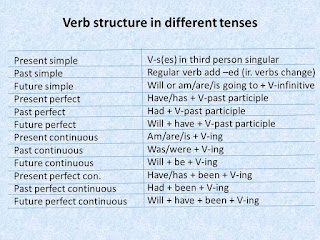Verb Phrases & Tenses

1. VERB PHRASES Verb Phrases based on traditional grammar is a group of words in the form of the main verb and the auxiliary verb. While based on generative grammar is a predicate - main verb and all the elements that make it up: the auxiliary verb, complement (object sentences), and / or modifier, but not including the subject of the sentence. On traditional grammar : Main Verb On generative gramamar : +/- auxiliary verb + main verb +/- complement +/- modifier 2. EXAMPLE SENTENCES OF THE VERB PHRASES He cooks without oil. · Traditional grammar : cooks · Generative grammar : cooks without oil 3. TENSES Tense is a verb form that indicates an action or activity. Type of tenses is : a. Simple Present Tense b. Present Continous Tense c. Present Perfect Tense d. Present Perfect Continous Tense e. Simple Past Tense f. ...